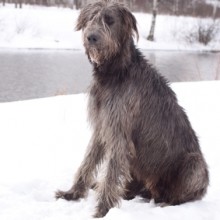Irish Wolf Hound
Lifestyle Needs

The Irish Wolfhound is the tallest of all the dog breeds, built for stamina and endurance. He has a rough, harsh coat which needs grooming often. He needs to live in a large house with a large garden, preferably near to open countryside. He needs plenty of exercise every day and the opportunity to run free. A good diet is essential to keep him strong and fit. He is usually a gentle dog, despite his size, but not a breed to be taken on lightly. Average lifespan 6.5 years.
Genetic Diversity
(Known as Coefficient of Inbreeding: 'COI'. It should be as low as possible.)
The UK Kennel Club breed average COI is 5.3% - See 'A Beginners Guide to COI'
Gene Pool Size
(Known as Effective Population Size: 'EPS')
222.22
EPS is a measure of how many individuals are contributing genetically to a breed population. It is a measure of the size of the gene pool in a breed. Lower than 100 is considered critical by conservationists and below 50 brings a breed close to extinction. For more information see the Kennel Club article.
Health and Welfare Problems due to Conformation
(Body shape and physical characteristics)
- Gastric dilatation volvulus (Bloat/Torsion) Common in deep chested breeds
BVA/KC Health Schemes: www.bva.co.uk/chs
- Elbow dysplasia (ideally O:O)
- Hip dysplasia: Breed 5 year mean score 7.4 (parents should be lower)
- Eye Disease: Progressive retinal atrophy (PRA) (annual testing); Multifocal retinal dysplasia (MRD) (annual testing)
Estimated Breeding Values (EBVs) : No EBVs are currently available for this breed
www.thekennelclub.org.uk/about-ebvs
DNA Tests Available
DogWellNet and IPFD Harmonisation of Genetic Testing for Dogs (HGTD)
www.dogwellnet.com/breeds
No DNA tests identified so far for this breed
Availability of a DNA test does not mean that it is always necessary or even desirable for breeders to use this test.
Other Breed-Specific Health Screening Schemes
Breed clubs health website: www.iwhealthgroup.co.uk
- Liver shunt testing of all puppies prior to being sold: Portosystemic shunt
- Annual Heart testing (stethoscope, ECG, ultrasound)
- Bitches under 2 years not to produce litter
- Bitches over 6 years not to produce a litter
- Bitches not to produce more than one litter in a 12 month period
Ask the breeder to show you the certificates for the above tests/screening for both parents. If any of the above tests have not been considered necessary by the breeder (and there may be good reasons), ask her to explain why.
Other Diseases Reported
(For which there are currently no genetic or screening tests for sire or dam)
- Cancer: Osteosarcoma
- Dilated cardiomyopathy (DCM)
- Atrial fibrillation (AF)
- Wolfhound Rhinitis
- Pneumonia
- Pyometra
- Puppy Paralysis
- Osteochondrosis – shoulder and stifle
- Liver Shunt
- Panosteitis
Ask the breeder about the medical history of the parents, grandparents and great grandparents. Consider carefully whether to purchase a puppy if some of these or other diseases are in the family line.
Ask about the breeder’s policy in cases of serious genetic diseases occurring to your puppy in later life. Good breeders will request to be informed of such events in order to improve future breeding decisions.
You are strongly advised to buy from a breeder who uses (or is prepared to use) the AWF Puppy Contract and Puppy Information Pack (PIP): www.puppycontract.org.uk
The breeder should also be familiar with the CFSG/DBRG Code of Practice for Dog Breeding